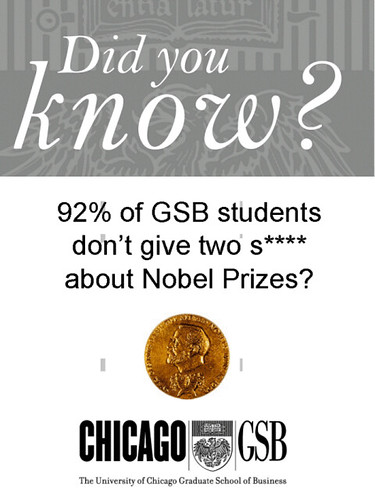I found this old “ad” from an April 1st issue of Chibus, the Chicago GSB newspapertalking about the nobel prize…I think alumni would also like to see a much higher level of service from the Chicago GSB.

David Dalka attends and reports business events and conferences to discover the future of business where technology, organizations and customer exeperience meet. Also serves as emcee, moderator and motivational business keynote speaker.
I found this old “ad” from an April 1st issue of Chibus, the Chicago GSB newspapertalking about the nobel prize…I think alumni would also like to see a much higher level of service from the Chicago GSB.

The University of Chicago Graduate School of Business (Chicago GSB) was rated the top MBA program in the Business Week bi-annual MBA survey of recruiters and students.
As a proud alumni, I want be clear that I appreciate the quality students, alumni and faculty at Chicago GSB.
However, theses surveys have not changed much since the rating systems were started several decades ago. What’s missing from that survey is alumni and the alumni experience now that MBA programs are a mature and not a growth industry. The metrics and experience here is much more unclear and are overdue for significant redesign.
Some questions I’d like to see in a redesigned survey that should carry a one third weighting alongside current students and alumni:
1. What is the alumni satisfaction rating of the institution from alumni at the 5, 10, 20 year mark?
2. What Internet based networking tools are in use? For example, I’ve asked Ted Snyder for a Simple Machines Message Board for all alumni (privacy set to no outside view) for several years and this has not been made a priority which is sad as it’s simple to implement. I want to be able to post obscure topics and find that needle in the haystack, whether I’m going to Shanghai and need to network, what to find others interested in using blog buzz to help price options or other new topics of interest. In other words, which school has not only the best network, but a culture of lifting all boats and leaving nobody behind?
3. What percentage of the alumni does the institution have accurate contact data for in a shared directory for all alumni to use? What is the strategy to create value so that all alumni are excited about staying in touch with the school and the network?
4. What is the ratio of dollars spent on alumni every year versus new student attraction? If it’s a quality alumni experience, the ratio will be less. This is a simple metric to calculate once the data is transparent.
5. What percentage consider themselves fully employed and utilized?
6. Do salaries really go up from graduation level or are most of these salaries higher due to churn and burn industries with long hours? Stated a different way are the salaries the GMAC publishes for the sole purpose of student attraction misleading? Some suggest that they are. Considering the GMAC publishes these studies during the application season, the business school self-reported salary data is highly suspect.
7. As the baby boomers age and pockets of shortages arise, we need to change the campus recruiting policies to focus on hiring gifted thought leaders based on competencies regardless of year of graduation – there are pockets of underemployed MBA’s form the 2001-2003 era that should be redeployed fully to roles worthy of their skills – the current process doesn’t allow this to occur and it is obsolete – it exists only to encourage student attraction and influence each year’s performance stats – you see it in the Business Week stats – it’s all about salaries (which are inflated because they are mostly not jobs with normal hours) – isn’t there more to life than just salary?
8. What percentage of the alumni are currently giving gifts to the school?
9. What percent of alumni are living in the geographic region of their choice?
10. Does the school have functional and relevant alumni activities both in industry verticals and in geography?
These are just a few of the metrics that I would invite Business Week, Wall Street Journal and Financial Times to explore fully for overhaul. Please feel free to comment and add ideas to this discussion, link to this post or forward it to anyone via e-mail whom could influence this positive and needed metric changes. Thank you for joining the conversation for needed reform.